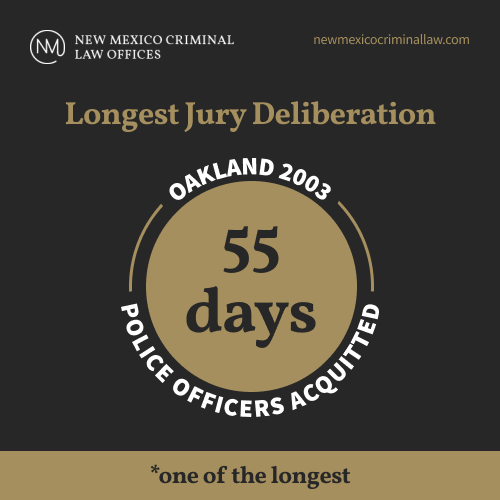
Every criminal defendant wants to know how to predict a jury verdict accurately. Many experts, commentators, and the average person have varying opinions on what a verdict will be based on the length of jury deliberation. Many believe the quicker a jury returns a verdict, the more likely the jury will come back with a guilty verdict—and the longer they take to deliberate, the more likely the verdict will be guilty. However, some believe the exact opposite is true.
Unfortunately, there is no specific way of knowing what the jury will decide; there are only predictions.
How Long Does Jury Deliberation Take?
There is no exact answer as to how long jury deliberation might take. Jury deliberations are truly unique to each case. Not only is each case different, but each jury is utterly unique as well. The jury is a combination of different individuals from all walks of life with various world views and opinions. This unique combination only compounds the difficulty of making accurate result predictions.
Depending on the case, jury deliberation can last just a few minutes to a few days or weeks.
A recent high-profile case that garnered intense media coverage is the Kyle Rittenhouse case. Going into the case, many people believed the State had a surefire win. However, the jury deliberated into the second, third, and then final fourth day. As the days drew on, it became more apparent that whatever the verdict was going to be, it was not quite the slam dunk the State thought it was.
Why Is There No Time Limitation on Jury Deliberation?
In most state and federal courts, juries must reach a unanimous decision. In other words, every single juror must agree with the decision. Since the verdict must be unanimous, there is no set time limit on jury deliberation. Once the trial concludes and the court provides the jury instructions, the case is now in the hands of the jury until they reach a verdict—however long that might be.
While many believe the length of deliberations can predict the outcome, other factors influence the time frame. Often, the reason for lengthy or short deliberations is the case’s complexity. It stands to reason that the more evidence presented at trial, the more the jury will have to comb through and consider during deliberations.
What Does a Long Jury Deliberation Mean?
Many people believe a long jury deliberation favors the defendant because there was no quick rush to vote “guilty.” Others believe that a long deliberation means the jurors believe the defendant is guilty but are taking their responsibility seriously. Instead of rushing, juries leaning towards a guilty verdict often comb through the evidence carefully before making the final decision to convict someone of a crime. In the end, a long deliberation really just means the jurors are taking their time to go through the evidence and discuss their positions. This can end in either a guilty or not guilty verdict.
A long jury deliberation could mean the jurors are at an impasse or a deadlock. If this happens, the jury’s foreperson sends a note to the judge advising that the jurors cannot reach a unanimous agreement. The judge almost always instructs the jurors to return to the jury room and do their best to come up with a unanimous decision.
The Allen Charge
The court’s instruction is what is known as the Allen Charge. When a judge reads the Allen Charge, they encourage the jurors to listen to each other, not give in to peer pressure, and make their best effort to reach a unanimous verdict. The instruction also reminds the jurors that should they not reach a verdict, the case will likely be tried all over again before a new jury.
The Allen Charge dates back to 1896 from a Supreme Court case, Allen v. the United States. At defendant Alexander Allen’s third murder trial, upon word the jury was having difficulty reaching a decision, the judge instructed them to go back and reconsider the evidence and their opinion of the case. The judge reiterated the importance of reaching a decision.
To this day, the Allen Charge can be an essential part of successful jury deliberation.
What Does a Short Jury Deliberation Mean?
If you are following a trial or catch glimpses of coverage on TV, you will often hear commentators predicting jury verdicts based on the length of deliberations. From the time the jury gets the case, commentators and experts will count the minutes that the jury is out. And they will spend those minutes speculating on the verdict and debating with one another on what the result will be.
All we can really know is that a short deliberation means both sides presented a solid case that the jurors understood. If the jurors are not left with many questions or don’t feel the need to go over all the evidence again, this will shorten the deliberations—regardless of what the final verdict is.
What Is the Longest Jury Deliberation on Record?

Official statistics are not kept on jury deliberation. However, when juries take an exceptionally long time to reach a verdict, it typically draws attention to the case.
The longest-known jury deliberation took place in Oakland, California. In 2003, a jury took a full 55 days to deliberate before acquitting three former Oakland police officers of the assault and false arrest of residents in the city’s poorest neighborhoods. The jury acquitted them on eight counts, and the judge declared a mistrial on the remaining 27 charges.
Accommodations for Jurors
Given the unknown amount of time jurors could spend trying to decide a case, jury deliberation rooms should have reasonably comfortable accommodations, including a bathroom, climate control, soundproofing, and more. Many courthouses have designated jury assembly rooms or conference rooms. In addition to comfort, the purpose is to protect the privacy of the jurors and assure confidentiality. Phones are also not allowed in the jury deliberation room.
Contact Our Experienced Criminal Defense Lawyers in Albuquerque
We have dedicated our careers to criminal defense litigation at the New Mexico Criminal Law Offices. In any criminal defense case, our goal is to get our client an acquittal, dismissed charges, or the best possible resolution for their case under the circumstances. We use every legal avenue at our disposal to resolve your case quickly, but if we need to, we are always prepared to take your case to trial. If you or someone you love is facing a criminal trial, let us put our knowledge and experience to work for you. Contact us today.

